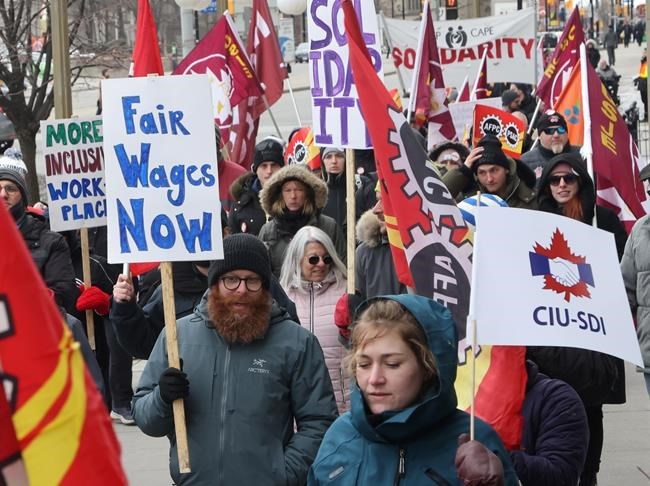OTTAWA — The country's largest federal public service union says if a deal isn't reached with the federal government by 9 p.m. EDT on Tuesday, it will launch a strike the next day.
The Public Service Alliance of Canada says some 155,000 employees are prepared to walk off the job beginning Wednesday, including 35,000 workers from the Canada Revenue Agency.
Mediated contract negotiations between the union and the Treasury Board continued over the weekend in what the union described as the government's final chance to reach a deal.
Chris Aylward, the union's national president, said at a news conference Monday morning that some progress has been made — but not enough to call off a strike.
"Despite some progress at the bargaining table, our members are frustrated that while negotiations drag on, they continue to fall behind," said Aylward.
"We've already been at the table for nearly two years and these workers can't wait any longer. That's why we're setting a clock on this round of bargaining."
He said CRA workers are also back at the bargaining table Monday and Tuesday after announcing their own separate strike mandate on April 7.
Unless they reach their own deal by Tuesday evening, those workers will strike, too, he said.
The biggest sticking point in the talks appears to be pay, with the union calling for raises to keep up with inflation and the rising cost of living.
The Treasury Board released a statement on Monday afternoon saying that it offered the union a nine per cent raise over three years on Sunday, on the recommendation of the third-party Public Interest Commission.
"After what both the government and the PSAC describe as many days of productive discussion and progress on many issues, we are disappointed to hear that, should an agreement not be reached, the PSAC will begin strike action," said the statement.
Last year, the government had offered a roughly two per cent annual wage increase over a four-year period, accounting for increases of 1.5 per cent for 2021, three per cent for 2022, two per cent for 2023 and 1.75 per cent for 2024.
The union has pushed for annual raises of 4.5 per cent for the next three years.
Prime Minister Justin Trudeau told reporters on Monday morning that although inflation is going down, the government needs to do its part to support workers who are currently struggling.
He said he is hopeful an agreement can be reached.
"There have been constructive advances and offers and we're very hopeful that we're going to be able to resolve this," Trudeau said.
In addition to pay increases, the union also wants to negotiate greater limits on contract work, more anti-racism training and provisions for remote work.
In its statement, the Treasury Board said the union has made it clear that enshrining remote work in the collective agreement is a "deal-breaker."
But including the provisions as drafted by the union would "severely impact the government's ability to deliver services to Canadians and would limit its ability to effectively manage employees within the public service," the Treasury Board said.
Jennifer Carr, the president of the Professional Institute of the Public Service of Canada, said in a statement that her union stands in solidarity with the Public Service Alliance of Canada.
"If our … colleagues choose to take collective action, we will inform our members about actions they can take to show their support," she said.
Carr said the institute has also been in active negotiations with the federal government, but has chosen to pursue arbitration.
Should the union strike on Wednesday, many federal services from tax processing to passport renewal could be affected — with departments and agencies signalling which essential services will continue during a strike and which may be disrupted.
"We want to have an impact on the government. We will try to have as least impact on Canadians as possible," said Aylward.
Aylward said if they go on strike, federal public servants will be picketing at strategic locations across the country.
The Treasury Board said it is "making every effort to avoid a labour disruption."
This report by The Canadian Press was first published April 17, 2023.
———
This story was produced with the financial assistance of the Meta and Canadian Press News Fellowship.
Cindy Tran, The Canadian Press
Note to readers: A previous version of this story incorrectly stated that the federal government had previously offered the union a pay increase of roughly two per cent a year over five years. In fact, the offered pay increase was roughly two per cent a year over four years.


